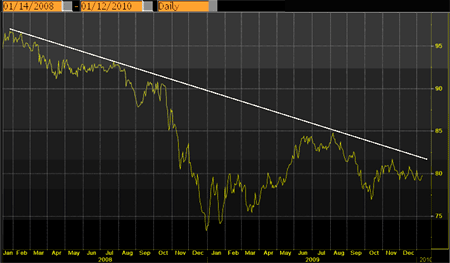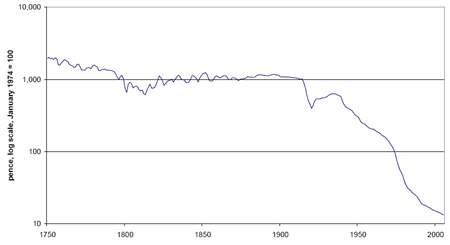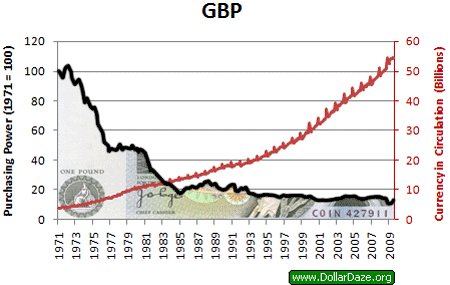Get the latest financial news, insights and expert analysis from our award-winning MoneyWeek team, to help you understand what really matters when it comes to your finances.
You are now subscribed
Your newsletter sign-up was successful
Want to add more newsletters?

Twice daily
MoneyWeek
Get the latest financial news, insights and expert analysis from our award-winning MoneyWeek team, to help you understand what really matters when it comes to your finances.

Four times a week
Look After My Bills
Sign up to our free money-saving newsletter, filled with the latest news and expert advice to help you find the best tips and deals for managing your bills. Start saving today!
Gold bugs are forever telling you to buy gold because it is 'nobody else's liability'. It's become one of those hackneyed phrases that has almost lost its meaning.
But recent events in Venezuela give us a nice illustration of what that phrase really means. And there's a stark, but important message for savers everywhere.
Inflation is currently running at 27% in Venezuela. That's just the official figure. You can expect the real number to be considerably higher.
MoneyWeek
Subscribe to MoneyWeek today and get your first six magazine issues absolutely FREE

Sign up to Money Morning
Don't miss the latest investment and personal finances news, market analysis, plus money-saving tips with our free twice-daily newsletter
Don't miss the latest investment and personal finances news, market analysis, plus money-saving tips with our free twice-daily newsletter
Earlier this month, the Venezuelan president Hugo Chavez, devalued the bolivar by half, from 2.15 per US dollar to 4.30 per dollar. There will be a second peg, subsidised by the government, of 2.60 bolivars per dollar for essential imports such as food, medicine and machinery.
This devaluation has effectively doubled the cost of imported goods and halved the Venezuelan people's purchasing power in a single stroke. Savers though I doubt there are that many given the country's precarious situation will have had half of their wealth effectively wiped out overnight.
Chavez is doing it, he said on state TV, 'to boost the productive economy, to reduce imports that aren't strictly necessary and to stimulate exports.' But that won't be the effect. All his actions will do is discourage people from working at all. Leaving aside the moral issue of whether government should have the power to do that (and, largely speaking, with our modern system of money and credit, they do), many Venezuelans will now ask themselves: 'What is the point of my working at all, if the proceeds are going to be devalued so suddenly?'
But any Venezuelan who happened to have converted some of their wealth into gold would be protected from these government foibles at least, as much as is possible under the circumstances. Chavez cannot suddenly devalue gold by half to 'boost the productive economy'. So the proceeds of that individual's labour would have been preserved. The purchasing power of gold against essential goods such as food, energy and shelter remains unchanged in fact it's probably risen.
I remember backpacking across South America in the early '90s. Venezuela was one of the wealthiest, most advanced nations on the continent. It's such a shame to now see the country on Hayek's 'Road To Serfdom', or, worse still, to Zimbabwe.
Of course, Venezuela is also now run by a man who last autumn wanted to ban singing in the bath or the shower, as it is a distraction from the 'basic business of washing'. What's happened there, can't happen here. Or can it?
"Chavez", writes Daniel Cancel on Bloomberg, "is trying to maintain spending for his 21st century socialist revolution as South America's largest oil exporter fails to emerge from its first recession in six years. The government is seeking to stem its falling popularity and the highest inflation rate among 78 economies tracked by Bloomberg, ahead of parliamentary elections scheduled for September."
Well, isn't our own government doing the same thing? Haven't they boosted spending over the last three years in an attempt to stem falling popularity ahead of an election? Isn't quantitative easing an elaborate form of currency devaluation? The effect of their actions has been that sterling has been losing its purchasing power. It buys us considerably less food, energy, medicine, industrial goods and anything else you care to mention (except mass manufactured goods from Asia) than it did five years ago.
It even buys us less foreign currency, as the chart below which shows sterling against a basket of foreign currencies shows. (I've drawn on that white line highlight the market direction) The only reason sterling has not fallen further is that other foreign central banks have been doing the same things to their own money. It is a race to the bottom.

Of course, I don't see anyone in the British government attempting to ban singing in the bath or anything like that. But our currency has devalued many times before. Anyone who remembers 1976 can tell you about the sterling crisis then. Financial markets were losing confidence in the pound. (I believe that loss of confidence is coming again. If sterling drops below $1.57 against the dollar, look out below).
The UK Treasury could not balance its books, while Labour's strategy emphasised high public spending. The prime minister, Jim Callaghan, was told there were three possible outcomes: a disastrous free fall in sterling, an internationally unacceptable siege economy, or a deal with key allies to prop up the pound while painful economic reforms were put in place. What will David Cameron be told should he win in the summer? The parallels to today are uncanny.
In more recent memory, we have had the sterling lows of March 1985 (when we almost hit parity with the dollar), then another crisis with 'Black Wednesday' in September 1992, when we were forced to drop out of the European Exchange Rate Mechanism.
What is worrying is that our current deficits, debts and spending are all at far greater levels than during any of the previous crises. So many toxic assets have been transferred from the balance sheets of banks to governments, that sovereign debt default not just here, but throughout the Anglo-Saxon economies is now a major risk.
It seems that the plan to solve the deficit is through devaluing the currency. But we are on a long-term path of devaluation. The chart below shows the purchasing power of sterling over the last 250 years a never-ending decline after we came off the gold standard in WW1.

The next chart, courtesy of Dollardaze.org, shows the purchasing power of sterling since 1971. After some stabilisation through the noughties, that decline appears to be resuming.

The financial crisis has not ended. There are still countless unidentified 'black swans' flying about in those looming, dark clouds. That's why it makes so much sense at the moment to own something that is nobody else's liability.
Get the latest financial news, insights and expert analysis from our award-winning MoneyWeek team, to help you understand what really matters when it comes to your finances.
MoneyWeek is written by a team of experienced and award-winning journalists, plus expert columnists. As well as daily digital news and features, MoneyWeek also publishes a weekly magazine, covering investing and personal finance. From share tips, pensions, gold to practical investment tips - we provide a round-up to help you make money and keep it.
-
 Should you buy an active ETF?
Should you buy an active ETF?ETFs are often mischaracterised as passive products, but they can be a convenient way to add active management to your portfolio
-
 Power up your pension before 5 April – easy ways to save before the tax year end
Power up your pension before 5 April – easy ways to save before the tax year endWith the end of the tax year looming, pension savers currently have a window to review and maximise what’s going into their retirement funds – we look at how

